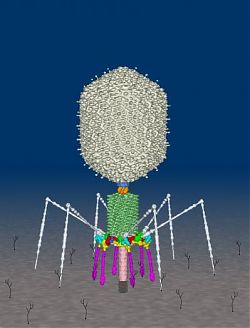Escherichia coli O157:H7 is an important foodborne pathogen that causes severe bloody diarrhea, hemorrhagic colitis, and hemolytic uremic syndrome.
 Ruminant manure is a primary source of E. coli O157:H7 contaminating the environment and food sources. Therefore, effective interventions targeted at reducing the prevalence of fecal excretion of E. coli O157:H7 by cattle and sheep and the elimination of E. coli O157:H7 contamination of meat products as well as fruits and vegetables are required.
Ruminant manure is a primary source of E. coli O157:H7 contaminating the environment and food sources. Therefore, effective interventions targeted at reducing the prevalence of fecal excretion of E. coli O157:H7 by cattle and sheep and the elimination of E. coli O157:H7 contamination of meat products as well as fruits and vegetables are required.
Bacteriophages offer the prospect of sustainable alternative approaches against bacterial pathogens with the flexibility of being applied therapeutically or for biological control purposes.
This article reviews the use of phages administered orally or rectally to ruminants and by spraying or immersion of fruits and vegetables as an antimicrobial strategy for controlling E. coli O157:H7. The few reports available demonstrate the potential of phage therapy to reduce E. coli O157:H7 carriage in cattle and sheep, and preparation of commercial phage products was recently launched into commercial markets.
However, a better ecological understanding of the phage E. coli O157:H7 will improve antimicrobial effectiveness of phages for elimination of E. coli O157:H7 in vivo.
Use of bacteriophages to control Escherichia coli O157:H7 in domestic ruminants, meat products, and fruit and vegetables
Foodborne Pathogens and Disease, June 2017, ahead of print, Wang Lili, Qu Kunli, Li Xiaoyu, Cao Zhenhui, Wang Xitao, Li Zhen, Song Yaxiong, and Xu Yongping, https://doi.org/10.1089/fpd.2016.2266
